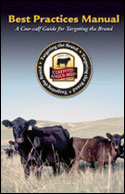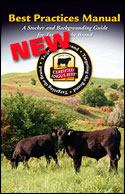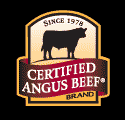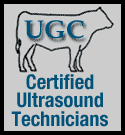Care For When They're Down
Bilingual nonambulatory cattle management training
program with certification offered.
Beef and dairy producers, veterinarians and other people involved with animal agriculture condemn willful acts of animal abuse.
A key component to preventing this type of cruelty is the education of animal caregivers on downed-animal care and humane euthanasia techniques. An online nonambulatory cattle management training program that allows tracking of the people who have completed the training is now available in English and Spanish for animal caregivers on beef and dairy cattle operations (http://www.animalcaretraining.org).
The Animal Care Training Program, managed by the Beef Cattle Institute (BCI) at Kansas State University (K-State), was developed by beef and dairy cattle veterinarians, animal scientists, farmers and ranchers to aid the beef and dairy industries and provide 24-hour relevant training for animal caregivers.
There are modules available to help producers gain knowledge on how to make the difficult decision on when to euthanize an animal. The modules' recommended methods of how to euthanize animals are described and illustrated in accordance with the American Association of Bovine Practitioners (AABP) and the American Veterinary Medical Association (AVMA) guidelines.
"Animal abuse is not tolerated in our industry; protecting our animals from abuse starts with proper training of those caring for the animals," says Dan Thomson, Jones professor of production medicine and BCI director. "Care for downed animals and humane euthanasia are not pleasant. However, it is our responsibility to care for these animals and relieve their suffering in a professional manner with dignity for the animals that provide for us."
Farms and ranches need to be responsible
"Proper training of individuals caring for these animals is the responsibility of the farm or ranch," he says. "The ability to verify or track the training is important to show that individuals received a standard or level of training to care for the animals. Also, if animal abuse occurs, the person was trained appropriately, but independently chose to act inappropriately."
The AABP recently reported on the animal abuse incident in Hart, Texas, stating that the people who performed the willing acts of animal abuse on the calf ranch should be prosecuted and procedures need to be put in place to prevent these types of acts from happening in the future. The incident was captured by undercover video and released to the public by a group called Mercy for Animals. This group is calling for stricter legislation to prevent people from abusing animals.
"Proper euthanasia is a very important issue that we face in the livestock industry. If an animal is euthanized, it needs to be done in a rapid, efficient manner that follows one of the three AVMA-recognized methods," says Jan Shearer, professor of veterinary diagnostic and production animal medicine at Iowa State College of Veterinary Medicine. "It is absolutely critical and essential for those individuals [who] euthanize animals to be properly trained, whether they are owners, managers or employees. Many employees on large dairy operations and feedlots are Spanish-speaking, and the online training modules allow those employees to be properly trained in nonambulatory cattle management. The modules increase awareness of euthanasia, understanding of euthanasia and educate animal caretakers how to properly do their job."
The effectiveness of online training has been documented in a peer-reviewed journal by animal science and veterinary faculty to improve farm, ranch or dairy employee knowledge base in areas such as downed animal care and euthanasia, regardless of language preference or experience.
Ryan Ruppert, senior director, Beef Quality Assurance (BQA), National Cattlemen's Beef Association, says, "The animal abuse avoidance and euthanasia certification on the Animal Care Training program are valuable tools to advance your operation and continue to implement BQA. The proper ways to euthanize and handle distressed animals are based on AVMA standards. Certifying your employees in proper euthanasia and animal abuse avoidance shows your commitment to the best care you can provide for the cattle that you care for every day."
For more information about Animal Care Training, visit http://www.animalcaretraining.org or http://www.beefcattleinstitute.org.
[Click here to go to the top of the page.]














